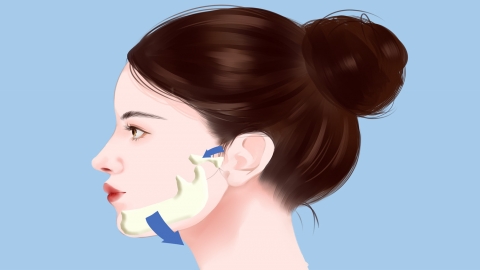下巴处按压疼痛的Cause和TreatmentMethod
Pain upon pressing the chin area may be caused by excessive chewing, trauma, temporomandibular joint disorder, lymphadenitis, folliculitis, and other conditions. Symptoms can be improved by reducing chewing strain, applying cold compresses, adjusting lifestyle habits, and medical treatment. If symptoms persist or are accompanied by fever or worsening swelling, prompt medical attention is necessary.

1. Excessive Chewing: Prolonged chewing of hard foods or frequent mouth opening can lead to muscle fatigue around the chin, causing soreness when pressed. Symptoms may slightly improve with rest. It is recommended to reduce intake of hard foods such as nuts and hard candies, avoid prolonged chewing, and allow the jaw muscles adequate rest.
2. Trauma or Impact: A direct blow to the chin from a fall or collision can cause local soft tissue injury, resulting in significant tenderness upon pressure, possibly accompanied by bruising or swelling. It is advised to apply ice packs within the first 48 hours to reduce swelling, followed by warm compresses after 48 hours to promote blood circulation and relieve pain.
3. Temporomandibular Joint Disorder (TMD): Long-term unilateral chewing or stress may lead to dysfunction of the temporomandibular joint, causing pain upon pressing the jaw joint, along with difficulty opening the mouth and joint clicking. Patients may take medications such as ibuprofen sustained-release capsules, diclofenac sodium enteric-coated tablets, or eperisone hydrochloride tablets under medical guidance to alleviate symptoms.
4. Lymphadenitis: Infections in the oral cavity or throat may cause inflammation and swelling of the lymph nodes under the chin. These swollen nodes are tender to touch and may be palpable, sometimes accompanied by sore throat. Under medical supervision, medications such as cefuroxime axetil tablets, amoxicillin-clavulanate potassium tablets, or Pudilan anti-inflammatory oral liquid may be used to relieve discomfort.
5. Folliculitis: Bacterial infection of hair follicles on the chin skin can cause localized inflammation, leading to pain upon pressure, with red papules or pustules appearing on the skin surface, possibly accompanied by mild itching. Follow medical advice to use mupirocin ointment, fusidic acid cream, or cefradine capsules to improve symptoms.
Daily care should include keeping the chin area clean and avoiding external irritation; maintaining a light diet and avoiding spicy or hard foods; ensuring regular sleep patterns and avoiding overexertion to support overall health.




